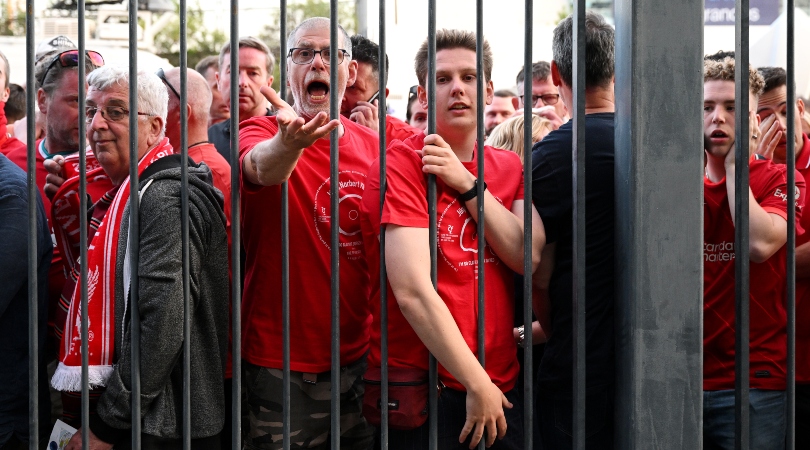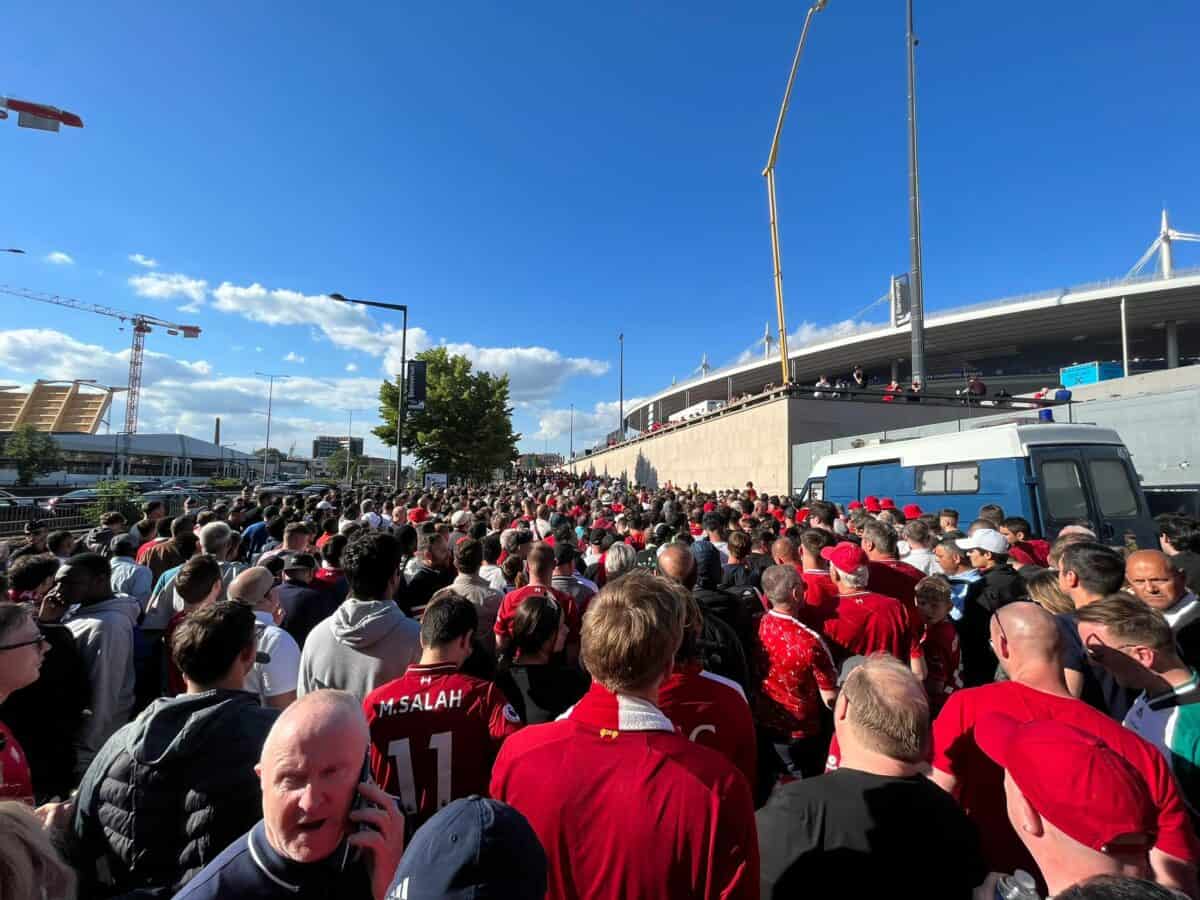Welcome to Paris: How not to host the Champions League final
Mishandling, miscommunication and misrepresentation around security and tickets for the Liverpool vs Real Madrid Champions League final led to a dangerous situation

The best features, fun and footballing quizzes, straight to your inbox every week.
You are now subscribed
Your newsletter sign-up was successful
Want to add more newsletters?

Five times a week
FourFourTwo Daily
Fantastic football content straight to your inbox! From the latest transfer news, quizzes, videos, features and interviews with the biggest names in the game, plus lots more.

Once a week
...And it’s LIVE!
Sign up to our FREE live football newsletter, tracking all of the biggest games available to watch on the device of your choice. Never miss a kick-off!
Join the club
Get full access to premium articles, exclusive features and a growing list of member rewards.
The Champions League final, in Paris, two heavyweights of European football. It was meant to be a glorious occasion. It wasn’t. Indeed, it wasn’t even really in Paris, according to Thierry Henry at least.
“The stadium is in Saint-Denis, not Paris” Henry said on live TV in America before the final and any issues were reported. “It’s not Paris. Trust me, you don’t want to be in Saint-Denis,” he warned. “It’s not the same as Paris, trust me.”
Saint-Denis is a suburb north of Paris, a deprived area that, before the pandemic had an unemployment rate of 40% - a figure that some estimates say is now almost 70%. It was previously described as the poorest area of mainland France, well known for its high concentration of foreign nationals, neglected by the state, with the pandemic amplifying the inequality.
Such context is key to understanding how and why the issues around the 2022 UEFA Champions League Final arose. The videos of local gangs scaling fences does not begin to show bad the situation was. The pickpocketing, mugging and attacking of supporters both before and after the match, of both sets of fans, Liverpool and Real Madrid, would be more evidenced were it not for fans being afraid to take their phones out to record the situation without them being snatched away by organised gangs armed with knives.
It is vital context to how things began to unravel at the Stade de France. When the final investigations are delivered, the role of these local gangs - and the police and stewards failing to stop them - will be explained as a key factor.
There are other major contributing factors; including a train strike designed to create “chaos"; the police tactics of funnelling supporters; and a severe lack of direction or communication to supporters from UEFA.
Alarm bells and train strike
For many, the alarm bells began earlier in the day, over 10km away from the Stade de France at the area designated as Liverpool’s fan park.
The best features, fun and footballing quizzes, straight to your inbox every week.
Liverpool were given a huge fan ‘meeting point’ far away from the stadium, whereas as Real Madrid’s was located nearer to the stadium. The policing of the fan park, funnelling fans into a very narrow entrance way in order to access the designated area inside was a sign of things to come.
Many fans we spoke with opted not to enter the actual fan park itself, and others took this as a warning of what was to come at the stadium and therefore setting off even earlier.
The journey to the stadium is also where the problems begin and is more key to the situation than has been reported so far. There are two stations that serve the Stade de France, but one was showing as not in use due to a train strike.
La Tribune newspaper reported in the days leading up to the final that RATP unions wanted to “spoil the celebration” of the final, therefore planning to “disturb” RER B.
On the day, a single tweet, in French at 5.38pm, from RER B, announced that “additional trains will run between 7pm and 8pm.” None of this was communicated to supporters and no staff on the Metro system communicated as such. The majority of supporters therefore took the RER D line.
One supporter we spoke with explained that only a local telling him it would still take them to the stadium meant he avoided the heavily congested other train service. No surprise then, that his train was comparably empty.
The AFP news agency has since reported that Paris transport unions have hailed the “success” of their strike on Saturday, which saw the RER B train not in full service.
This train strike created the bottleneck and the domino effect from there began the issues, with the French authorities failing to react - or, actually, be proactive in light of the strike.
“This is where for many, the nightmare begins,” supporter Keifer MacDonald tells FourFourTwo.
There was zero, literally zero, signage or stewards to direct fans to the stadium, the only option was to follow the crowd - and therefore enter the bottleneck as supporters were funnelled around a narrow gap against a wall, made worse by police cutting off the underpass with their vans.
MacDonald arrived at the first ticket check at 6.30pm local time – two and a half hours before kick-off. Another supporter, Danny Dwyer, got to the first ticket check at 6pm. He explains how he was not searched. “That raised alarm bells,” he says of the security.
Dwyer explains: “Locals got past this first perimeter and up to the turnstiles with knives, which they used in random, unprovoked attacks on genuine fans with tickets.”
At this point, the stories are all the same – and lots of them. Within 24 hours of Liverpool FC opening an online form for supporters to input their testimonies, the club received 5,000 submissions. Each will tell a similar story of the bottleneck created by the police, of local gangs getting past the security cordon; pickpocketing, stealing tickets and scaling fences to enter the stadium.
The actions of these locals, it appears from those on the ground and from both witness testimony and video evidence, led the police to close the turnstiles Y and Z, leaving supporters with genuine tickets locked outside, tightly packed together for over two hours.
“Stewards didn’t care and actually laughed in my face when I showed them my ticket through the railings asking for an update,” explains Dwyer.
There have been claims on social media from French locals, so far uncorroborated, that stewards were recruited just two weeks before the match and that some were either paid off during the days before the match by local gangs or indeed were even part of such local gangs.
“There were locals running straight past the stewards, who made little or no attempt to stop them,” explains MacDonald of the first security checkpoint.
This checkpoint is where the final at the Stade de France differed from other European finals that Liverpool have taken part in recently. In the last six years the Reds have played finals in Basel, Kyiv and Madrid – each of them had one thing in common: a very thorough external perimeter a long way from the stadium itself.
That external perimeter is intended to ensure that anybody without a ticket doesn’t even get near a turnstile. The external perimeter in Basel in particular was a significant distance from the St. Jakob Park, at least another 10 to 15-minute walk in some instances.
This is why, if the French authorities’ claim over the sheer number of fake tickets at turnstiles was true – which it isn’t, even some basic maths would tell you as such – they would effectively be admitting that their external perimeter failed.
By the many accounts, it seems this first so-called security perimeter was abandoned sometime around 7pm, allowing more ticketless locals free access right up the turnstiles.
A tragedy averted, somehow

“I saw a Liverpool fan covered in blood, absolutely raging at somebody he claimed attacked him and stole his ticket,” explains Dwyer. “The riot police stood around the man in question, protecting him as though the Liverpool fan was the enemy.”
When a gate was temporarily opened on some turnstiles, a crush developed. “It was terrifying,” recounts Dwyer. “I felt faint and on the verge of throwing up with fear. Middle-aged and elderly men were in tears, clearly triggered by fearing the worst.”
There were survivors from the Hillsborough disaster among the crowd and everybody else was acutely aware of the events of 1989. This both struck fear into the minds, but also, perhaps, ensured a tragedy did not happen.
It could be viewed that only because this was Liverpool supporters who were so aware of what could happen, a mass tragedy was avoided. Witnesses describe fans telling their loved ones to ‘no matter what, stay on your feet’ and ‘don’t let yourself go under’. There is a horrific image of a young supporter, not in his teens, with his neck upwards, tilted, gasping for air.
Supporters passed children and vulnerable up onto walls, and in some instances into the media compound set up for television companies. Former Liverpool player – and scorer of the winning goal the last time Liverpool faced Real Madrid in the European Cup final in Paris – Alan Kennedy, aged 67, was one of them.
When the police eventually started allowing supporters back into the stadium, some were allowed in without their ticket being scanned, others were told to crawl under the turnstile by stewards saying the machine wasn’t working.
“I attempted to scan my ticket but, despite purchasing it from the club, the turnstile went red,” explains MacDonald. At a second scan, it showed green and he was allowed in.
The ticket scanning machine is a huge area of contention, almost every supporter we spoke with says that their ticket, bought from legitimate sources, did not scan correctly the first time. Some took four or five attempts before getting the required green access light. This could also be the reason for the French officials' wild claims on the number of so-called fake tickets.
Liverpool defender Andy Robertson explained post-match how tickets he received from the club and gave to a friend, therefore certainly legitimate, were flagged by stewards as being fake.
Others describe tickets being handed to stewards to scan them, then the steward passing them off to ‘runners’ from local gangs who entered the stadium.
Dwyer eventually entered the stadium at 9.20pm local time but was unaware that kick-off had been delayed. Nowhere outside was it communicated that the kick-off had been delayed: yet another failing on UEFA’s behalf. An announcement could have at least eased tensions and anxiety among the waiting fans outside.
Post-match problems
After the match, the problems continued and in the dark of the night, some of the most severe attacks happened from locals waiting beneath underpasses en route to the Metro.
When FFT departed the stadium, we saw Liverpool fans climbing fences to get out of the perimeter - the same fences local youths had scaled earlier to get into the area. At the time, it wasn’t clear why fans were climbing out rather than taking the path towards the Metro, but it soon became clear as gangs awaited, intimidating supporters both Liverpool and Real Madrid, snatching mobile phones and wallets en-masse.
The first-hand accounts later emerged of how fans had been walked into such a dangerous situation, despite a heavy police presence. “There was so much security but so little protection,” says Dwyer.
A Real Madrid fan on Twitter described: “The same criminals were at the exit of the stadium in groups of 30-40 people rushing against Madridista families to rob them and more."
TV pundit and former Liverpool player Jim Beglin described it as the “scariest I’ve ever experienced," saying: “Organised gangs set about mugging departing fans. We ran a gauntlet of thuggery on our way to the Metro. Not a police officer in sight. Witnessed so many ambush attacks on unsuspecting attendees.”
The wife of Liverpool midfielder Thiago Alcantara wrote: “Constantly being threatened by bands of robbers, that were trying to assault us and slipped into the stadium without a ticket.”
“Madrid fans were robbed or attacked by gangs of what seemed to be locals, while exiting the Stadium or on the Subway,” explained another Madrid fan. “With a total absence of presence and action from French police. It almost seemed it was allowed on purpose.”
Once you’d made it away from the stadium, it didn’t mean you were safe. If you happened to have a hotel in the vicinity of the Champs-Elysees, you were ‘greeted’ by armed police at the top of every single Metro station along the famous avenue and if you had any football shirt on either told to remove it, cover it, or go back into the station.
Fines of €135 were the alternative for the ‘crime’ of wearing a football shirt in the city hosting a major football final. ‘Welcome to Paris,’ indeed.
Meanwhile, back at the Liverpool fan park, police launched tear gas immediately upon full time. That’s if you were ‘lucky’ enough to get in the fan park. One supporter we spoke with showed us a video of the riot police closing entry to the fan park over an hour before the scheduled kick-off, with hundreds of fans waiting patiently to enter. There was no announcement that the fan park had been closed for entry.
Now, the fallout continues, with French officials having changed tact from fans arriving late – as that can be proven not to be true – to fake tickets being the cause of the issues. The problem is that their claims are completely unsubstantiated and will also be proven to be untrue.
UEFA are yet to apologise for the issues, or indeed the absolutely scandalous initial reasoning given for the delayed kick-off being due to late-arriving fans.
Pressure from corporate sponsors, whose guests were also caught up in the chaos, will add to the UEFA needing to admit culpability eventually.
In the meantime, Paris is set to host the Rugby World Cup later this year and the Olympics next year. The Stade de France is the venue for the Rugby World Cup final and the athletics events at the Olympics. Will Paris learn from its mistakes or double down on its current narrative of lies?
Matt Ladson is the co-founder and editor of This Is Anfield, the independent Liverpool news and comment website, and covers all areas of the Reds for FourFourTwo – including transfer analysis, interviews, title wins and European trophies. As well as writing about Liverpool for FourFourTwo he also contributes to other titles including Yahoo and Bleacher Report. He is a lifelong fan of the Reds.
 Join The Club
Join The Club










